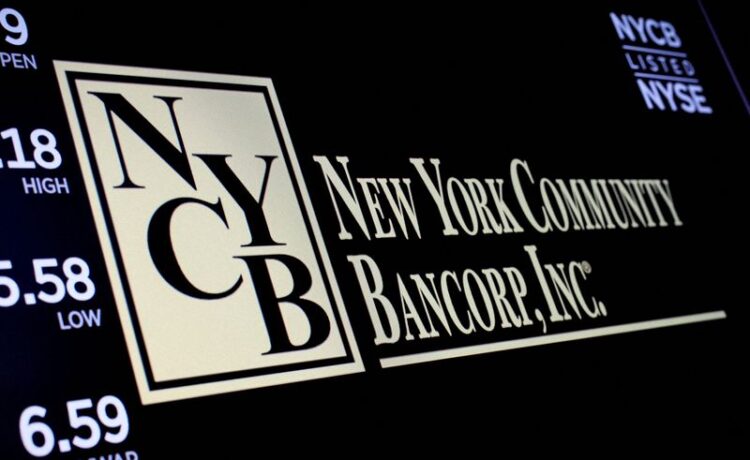(Removes extraneous word in paragraph 14)
By Niket Nishant, Manya Saini and Anirban Sen
(Reuters) -New York Community Bancorp said on Wednesday it had raised $1 billion from investors including former U.S. Treasury Secretary Steven Mnuchin’s Liberty Strategic Capital and named a former Comptroller of the Currency its new CEO.
Investment firms Hudson Bay Capital, Reverence Capital Partners, Citadel Global Equities, other institutional investors and certain members of the bank’s management also participated in the equity investment, according to NYCB.
The bank’s stock had a rollercoaster session, falling 45% prior to the announcement, bouncing 30% higher after finally closed 7.4% higher. KBW’s analyst Chris McGratty said in a note to clients that the capital raise is painful for existing shareholders but should reduce fear of systemic risks.
“This is a good solution for the broader system, shows ability to attract private capital, and the management and board overhaul provide credibility with investors”, McGratty wrote. He believes the bank may still sell assets and transfer credit risk to further increase its capital ratio above the current 10% target.
Kevin Heal, banking analyst at Argus Research, expects the deal to allay fears for depositors and added that unlike Silicon Valley Bank, which had uninsured deposits that were “blown off the door in billions”, NYCB does not have the same level of un-insured deposits.
Joseph Otting, the new BNCY CEO, is the former Comptroller of the Currency under president Donald Trump, and had been CEO and board member of OneWest from 2010 through 2015, when the bank was sold to CIT Group. One of the founders of OneWest bank is Steven Mnuchin, one of the new investors in NYCB. “In evaluating this investment, we were mindful of the bank’s credit risk profile,” Mnuchin said in a statement. Mnuchin will join NYCB’s expanded board.
NYCB has been under pressure since it posted a surprise fourth-quarter loss on Jan. 31, weighed down by higher provisions tied to its exposure to the beleaguered commercial real estate (CRE) sector.
It slashed its quarterly dividend by 70% to bolster capital to deal with stricter regulation that banks with assets of $100 billion and above are subject to. NYCB’s acquisition of Flagstar Bank in 2022 and Signature Bank assets last year pushed it above that threshold. The stock is down about 70% since its Jan. 31 announcement.
The latest round of sell-off in NYCB shares was triggered last week, when the bank disclosed it found “material weaknesses” in internal controls tied to its review of loans. It also revised its quarterly loss to 10 times higher than previously stated.
The bank on Wednesday named Joseph Otting, former Comptroller of the Currency, its new CEO. Otting will replace Alessandro DiNello, who will be the non-executive chair after serving as CEO for only a few days.
Liberty Strategic will infuse $450 million, Hudson Bay $250 million and Reverence Capital will inject $200 million, NYCB said. Jefferies was the exclusive financial adviser and sole placement agent for NYCB for the latest investment.
The capital infusion comes nearly one year after the failures of Silicon Valley Bank, and Signature Bank – which precipitated the regional banking panic which has undermined market confidence in some regional lenders.
The FDIC assisted the sale of both SVB and Signature, as well as later the auction of First Republic Bank, through guarantees against losses and allowing buyers to only take on certain assets: NYCB, for example, did not acquire Signature’s commercial real estate portfolio. PacWest meanwhile agreed in July to be sold to Banc of California, in a deal which saw private investors supply $400 million of new capital to help reinforce the combined bank’s balance sheet.
CRE CONCERNS
Several Wall Street analysts have flagged concerns that the lender’s exposure to CRE could also require it to build additional capital reserves to absorb potential losses on loans.
“We believe this review of internal controls could lead to additional CRE-related reserve building, particularly related to the company’s NYC rent-regulated multifamily exposure,” brokerage Wedbush wrote in a note earlier this month.
NYCB has pledged to reduce its exposure to CRE.
(Reporting by Niket Nishant and Manya Saini in Bengaluru and Anirban Sen, David French, Saeed Azhar and Tatiana Bautzer in New York; Additional reporting by Mehnaz Yasmin; Editing by Anil D’Silva, Sriraj Kalluvila and Shounak Dasgupta, Megan Davies, Nick Zieminski and Daviid Gregorio)
















